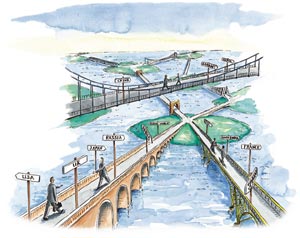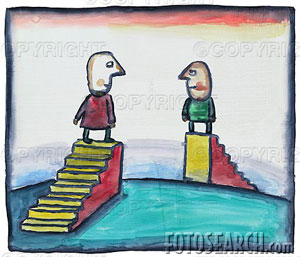2/27/2006
We should build bridges instead of walls - the alliance of the moderates
 Yesterday I went to a very interesting debate in the Melkweg in Amsterdam about the Danish cartoons, organised by Happy Chaos and www.marokko.nl.
Yesterday I went to a very interesting debate in the Melkweg in Amsterdam about the Danish cartoons, organised by Happy Chaos and www.marokko.nl.The speakers were:
- Imam Abdulwahid van Bommel
- Thomas von der Dunk (publicist/columnist)
- Michiel Vliek (social psychologist)
- Ahmed Aboutaleb (Amsterdam city councillor)
- Tarik Yousef (Amsterdam broadcasting company AT 5)
- Nan van Houte (Director of Frascati and De Brakke Grond Theatres)
- Mohammed Cheppih (former president of the World Muslim Liga)
- Paul Scheffer (publicist and member of the Labour Party (PvdA))
It was a very good mixture of different positions and they succeeded very well in their aim to create a constructive dialogue, instead of a simplistic irrational one, which is not very useful.
The views I disagreed with most were from Paul Scheffer. But at the same time I could see that his arguments were well founded, he has a different position than I, but he knows well how he can defend his position, that makes the discussion interesting.
 One of the most important conclusions of the debate was that the riots about the cartoons are in fact not really about whether it is allowed in the Islam to make images of the Prophet (as a terrorist) or about if religious insults should be forbidden by law or not. The core of the issue is about "exclusion". When a group, a minority in a pluriform society, feels excluded, they become angry. The anger coming from the east is something else of course. We agreed mostly that extremist leaders in the east should not decide for the West what kind of drawings can be made there and what not.
One of the most important conclusions of the debate was that the riots about the cartoons are in fact not really about whether it is allowed in the Islam to make images of the Prophet (as a terrorist) or about if religious insults should be forbidden by law or not. The core of the issue is about "exclusion". When a group, a minority in a pluriform society, feels excluded, they become angry. The anger coming from the east is something else of course. We agreed mostly that extremist leaders in the east should not decide for the West what kind of drawings can be made there and what not.Many speakers focussed on the problem of exclusion, which is at the same time the central theme of my dissertation. I especially found the explanation that the social psychologist gave of these mechanisms of exclusion very good. He referred to the book "In every human being a terrorist is hidden". He said that terrorists are no exceptional crazy people, they show "normal" behaviour in exceptional situations. Humans always want to understand the complex surroundings in which they live and they try to predict the behaviour of the people around them. In order to do so, to create a predictive model, they make simplifications. But in reality human behaviour is very difficult to predict, and through their simplications, people make mistakes, they assume things which aren't true. We put the people around us into simple categories, so we can clearly define and place them. In this we we ascribe the behaviour and the attitudes of people to their personality / background / group characteristics, not to the circumstances in which these people find themselves. Then people use rough-and-ready rules to make their judgements about these categories. People start to distinguish between "us" and "them", between the good in-group and the bad out-group. The way people make simplistic judgements about individuals, they also start to make judgements about masses. The images that arise like this contain many biases.
One example of the bias in judgements with regard to the in-group and the out-group:
- Positive behaviour of the in-group is being ascribed to the characteristics of that group (our behaviour is good because we are good people)
- Negative behaviour of the in-group is ascribed to external factors which they can't influence (it went badly but we cannot help that, it was due to negative circumstances)
- Positive behaviour of the out-group is being ascribed to the situation that arose by accident
- Negative behaviour is ascribed to the negative characteristics of that group
 To stop this process of growing polarisation and growing hate at both sides, Michiel Vliek said that he thought it would be wise to stop publishing this kind of offensive cartoons, at least for a while, to stop putting oil on the fire. He said that freedom of speech is usually considered to be so important because we want to have a real democracy in which every voice can be heard. But when the polarisation grows, this also makes it more difficult for certain voices to be heard. Polarisation means that people start to shout harder and that the extremists are being heard more than moderate people.
To stop this process of growing polarisation and growing hate at both sides, Michiel Vliek said that he thought it would be wise to stop publishing this kind of offensive cartoons, at least for a while, to stop putting oil on the fire. He said that freedom of speech is usually considered to be so important because we want to have a real democracy in which every voice can be heard. But when the polarisation grows, this also makes it more difficult for certain voices to be heard. Polarisation means that people start to shout harder and that the extremists are being heard more than moderate people.Behaviour to imitate others mainly happens when identification with these others takes place. I imitate people whom I consider as the same as me. The more a "us-them" athmosphere arises between Muslims and non-Muslims, the more moderate people in both groups will move towards extremists in that group, instead of towards moderate people in the other group. We, both Muslims and non-Muslims, should form an "alliance of the moderates". We should build bridges between the different groups in the society, not walls.
And here's a song of Limp Bizkit (never thought I would quote them) about building bridges:
Build a bridge to your mind
Takes me there everytime
Lay it all on the line
If there's a way
Build a bridge, make a path
Overlook the aftermath
Make my tears be your bath
If there's a way
Only if you'll take a ride
Go with me to the other side
Even though it's gonna crumble down
I'll keep building till you come around
Even though it's gonna fall apart, break my heart
I'll keep building 'till i die
Build a bridge of memories
Stretch it out overseas
To the end of the world
If there's a way
Build a bridge made of pain
Send my longing down the drain
Have no reasons to complain
If there's a way
Only if you'll take a ride
Go with me to the other side
Wait... please wait for me
Takes me there everytime
Lay it all on the line
If there's a way
Build a bridge, make a path
Overlook the aftermath
Make my tears be your bath
If there's a way
Only if you'll take a ride
Go with me to the other side
Even though it's gonna crumble down
I'll keep building till you come around
Even though it's gonna fall apart, break my heart
I'll keep building 'till i die
Build a bridge of memories
Stretch it out overseas
To the end of the world
If there's a way
Build a bridge made of pain
Send my longing down the drain
Have no reasons to complain
If there's a way
Only if you'll take a ride
Go with me to the other side
Wait... please wait for me
Comments:
<< Home
Esther,
I am writing a paper right now focusing on Levinas and Multiculturalism. I would love to talk through some ideas with you if you want. My grandpa was from the Netherlands,
Adam
ajl77@cornell.edu
Post a Comment
I am writing a paper right now focusing on Levinas and Multiculturalism. I would love to talk through some ideas with you if you want. My grandpa was from the Netherlands,
Adam
ajl77@cornell.edu
<< Home
